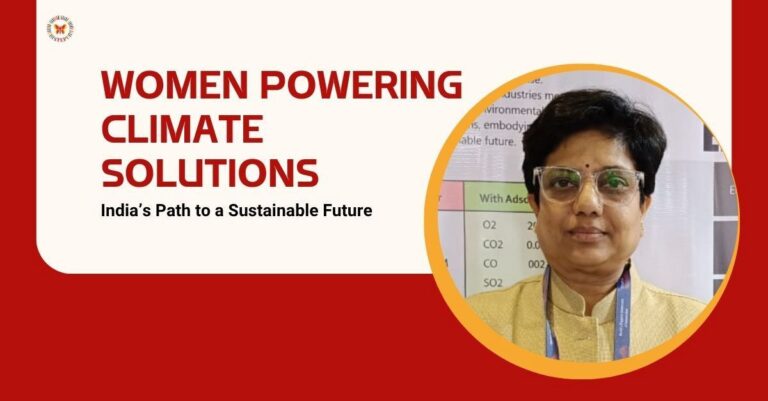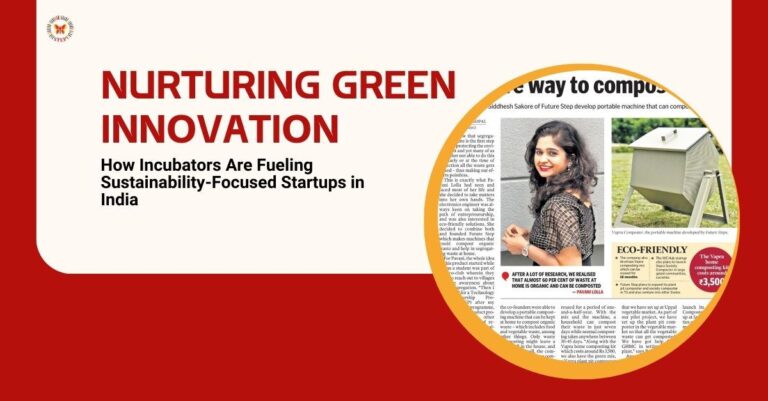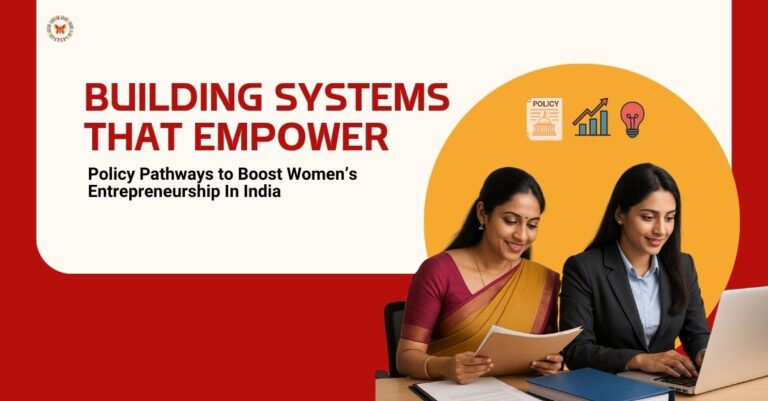UnPollute Winners: Women Entrepreneurs turning Sustainability into success
Can a simple act of recycling, upcycling, or rethinking consumption habits spark a movement toward a more sustainable future? The UnPollute Pitchfest showcased just that—how three women entrepreneurs are turning innovative ideas into impactful solutions, paving the way for a greener, more inclusive world.
India Recycles: Renu Pokharana
Business Model
India Recycles focuses on building a circular economy by reselling second-hand goods to the urban poor at affordable prices. The organization operates through mobile markets, traveling to slums, one-room apartment colonies, and construction sites to reach its target audience.
“Our philosophy is that even the poorest have affordability. We don’t like the idea of treating them as beneficiaries; they deserve choices, just like everyone else,” says Renu.
India Recycles also caters to wealthier customers through thrift shops, ensuring that items unsuitable for the urban poor are still repurposed and sold. They have already partnered with the Ahmedabad Municipal Corporation under the Recycle, Reuse, Reduce initiative and are in talks with Bhubaneswar Municipal Corporation for further collaboration.
Revenue Model
- Mobile Sales: Selling second-hand items directly to urban poor customers. Prices range from Rs. 5 to Rs. 50, generating around Rs. 40,000 monthly from 8-10 sales.
- Thrift Pop-ups: Items like vintage crockery, branded clothing, and accessories are sold through monthly thrift pop-ups, bringing in approximately Rs. 50,000-60,000 each month.
- Upcycling: Waste garments are upcycled into products like stuffed animals, tote bags, and jewelry, with sales peaking during festive seasons. These products are often sold to corporates for gift hampers.
Challenges
- Space and storage remain significant hurdles, especially during collection drives, when the volume of donations can be overwhelming.
- Expansion to other cities is another major challenge.
- Some items, such as shoes, socks, and undergarments, are difficult to repurpose.
- consumer behavior still poses a challenge, as there remains a stigma around buying second-hand goods.
Inspiration Behind the Project
“The fear of a future filled with more landfills and waste keeps me motivated to push for change,” says Renu.
She finds inspiration in her customers’ joy when they purchase quality items at affordable prices. One memorable moment was when a domestic worker beamed with joy after buying a Fabindia kurta for just 20 rupees, something she could never have afforded otherwise. For Renu, India Recycles is about offering dignity, choice, and access to quality goods to those who need them most.
STEP Experience
“Being part of the STEP sustainability conclave was an invaluable experience. It gave us a platform to share our journey, connect with like-minded partners, and explore collaborations, helping us expand our vision of a circular economy and sustainable consumption,” she says.
With the prize money from UnPollute, Renu plans to set up more mobile markets and thrift pop-ups, supporting innovative recycling and upcycling solutions and developing new product lines.
Future Plans
In the next five years, India Recycles aims to expand to at least two major cities, like Mumbai and Delhi. The goal is to set up markets in areas with significant urban poor populations, giving more people access to affordable, quality goods.
Advice to Sustainability Entrepreneurs
“Stay true to your mission, even when the challenges seem overwhelming. Focus on the people you serve, and let their resilience inspire you to keep pushing forward. Sustainability isn’t just a goal; it’s a necessity for a better future,” Renu says.
Green Gum: Founder Pahal Garwa
The Inspiration Behind the Project
Pahal grew up in a farming family in the semi-arid regions of Rajasthan, witnessing firsthand the struggles farmers face—limited rainfall, poor soil quality, and the constant need for additional nutrients. Driven by a passion for sustainability, she combined her expertise in finance with innovative agricultural practices to develop solutions.
Business Model
Green Gum is a prototype-stage startup that sustainably recycles dry cell batteries, transforming them into valuable agricultural products with zero carbon emissions. “We convert waste materials into valuable agricultural inputs, addressing multiple challenges simultaneously,” shares Pahal.
Revenue Model
- Direct Sales: NutriSphere Hydrogel, AquaRetain Seed Coat, and Zinc fertilizers are sold directly to farmers.
- Partnerships: Collaborations with agricultural cooperatives and government programs promote sustainable farming practices.
- Distribution Network Expansion: Expanding across more states in India to reach a wider market.
- B2B Opportunities: Exploring partnerships with large-scale agricultural companies to expand market presence.
- Licensing: Licensing technology to manufacturers in other countries to facilitate international market entry.
Challenges
Initially, Pahal faced financial challenges and lacked the specialized equipment necessary for product R&D. But with support from incubation centers and agricultural universities, she secured grants and access to state-of-the-art facilities.
STEP Experience
Pahal found her STEP experience invaluable. “The program was instrumental in refining our go-to-market strategy and connecting us with the right resources and networks,” she shares.
With the prize money from UnPollute, Pahal plans to invest in product optimization, market research, and ensuring compliance, as her startup is still in the prototype stage.
Advice to Aspiring Entrepreneurs
“Stay focused on creating a tangible impact. Listen to your users, iterate quickly, and don’t be afraid to challenge conventional practices. Persistence and passion are key in this challenging but rewarding field,” says Pahal.
My Thrift Baby Loot: Anisha Shetty
The Inspiration Behind the Project
Anisha’s journey began when she became a mother. She found herself overspending on baby products, with no easy way to pass on these items to families who could use them. This experience led her to create a platform that encourages sustainable choices for parents.
Business Model
My Thrift Baby Loot is a two-way e-commerce marketplace where parents can buy, sell, or give away gently-used kids’ products. The platform provides users with dashboards to easily manage their listings, orders, and prices, promoting a high-quality, eco-conscious shopping experience.
Revenue Model
- Commission: Charging a 20% commission on each product sold (minimum ₹100).
- Listing Fees: Minimal charges for boosting product visibility on the platform.
Impact
With an organic community of 23,000 moms on Instagram and over 800 parents on WhatsApp, My Thrift Baby Loot has built a loyal and growing community.
A heartwarming example of their impact is the story of Priyadharshini, who lost her husband while eight months pregnant. My Thrift Baby Loot launched a social media campaign that gathered 30 kg of essential items for her baby, showing the power of community support.
STEP Experience
Anisha describes her experience with STEP as invaluable. “The mentorship from STEP provided much-needed clarity and direction. I felt immense warmth and support in building a women-oriented community,” she shares.
With the prize money, she plans to invest in building the tech behind their platform, team building, and marketing to scale further.
Future Plans
Anisha aims to establish My Thrift Baby Loot as a go-to Indian brand for preloved kids’ products with a market share of over 50%. Plans include physical stores in Tier 1 cities and expanding the product range to include eco-friendly toys and organic clothing.
Advice to Aspiring Entrepreneurs
“Blend passion with solid business practices, while keeping profitability in focus. Ensure the platform is self-sustainable for the long run, “says Anisha.
The UnPollute Pitchfest was more than just a competition; it was a glimpse into a future where sustainability drives entrepreneurship. These inspiring ventures remind us that every choice we make—what we buy, reuse, or discard—has the power to shape our planet. The question is, are we ready to support and be part of this change?



